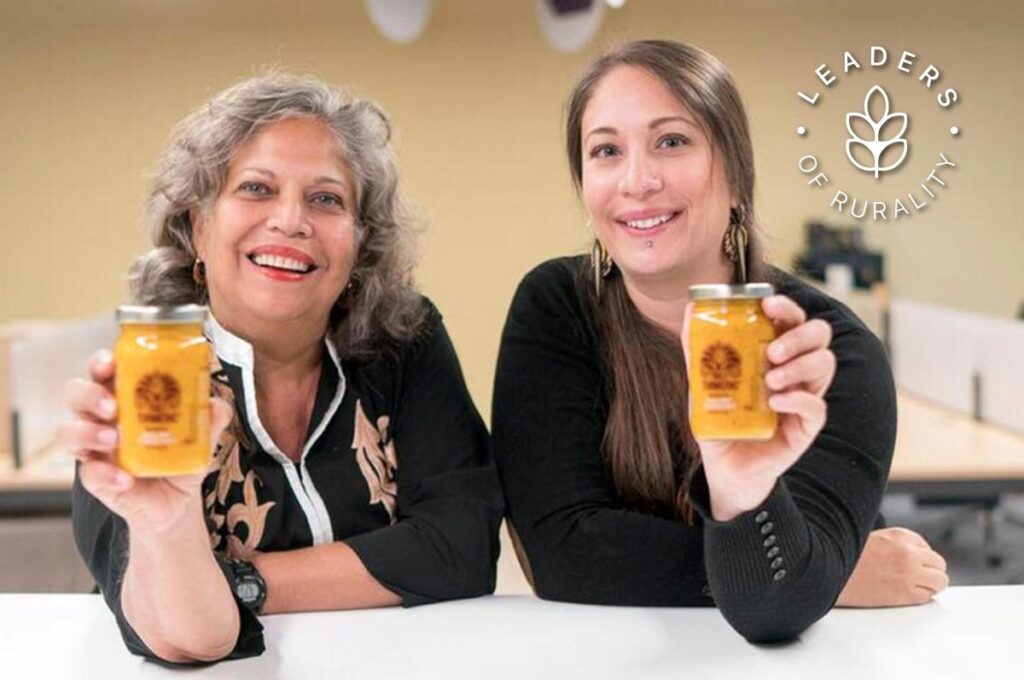
San Jose, 28 April 2025 (IICA) – Umeeda Switlo is a serial entrepreneur from Uganda who arrived in Canada as a refugee and later found her place in the world in Belize. There she converted turmeric, which was growing in the wild, into an important source of income for hundreds of farmers. She founded the company Naledo, along with her daughter, Nareena Switlo, and they have now been recognized by the Inter-American Institute for Cooperation on Agriculture (IICA) as Leaders of Rurality of the Americas.
In recognition of their work, this powerful mother-daughter rural management team, will receive the “Soul of Rurality” award. The award is part of an IICA project that highlights men and women who are leaving their mark and making a difference in the rural Americas – individuals who are key to the food and nutritional security and sustainability of the region and the planet.
Umeeda’s story is one of resilience and determination. She fled Uganda with her family, arriving as a refugee in Canada in 1972. She studied Marine Biology and Environmental Toxicology and launched several companies (ranging from organizing concerts to day care centers for children), until her work took her to Belize. The mere nine-month program saw her producing a manual on entrepreneurship for youth and reports on potential business opportunities, for presentation to the authorities of that Central American country.
During a visit to Toledo, the southernmost and least populated district of the country, Umeeda’s curiosity led her to notice that a plant that was critical to Indian cuisine—turmeric—was growing abundantly in the wild in that region.
That particular variety had arrived in the region in a most unusual manner – brought by laborers from India who had come to the country in search of a new life. At that time, Belize was still called British Honduras.
It seems that the workers arrived by boat with only a few belongings and some turmeric seeds, which would allow them to add a touch of flavor from home to the local cuisine. The seeds took on a life of their own and rapidly spread through the region. Today, they still occupy large tracts of Belize’s rural areas, alongside agricultural crops that are typical to that country, such as cocoa and black pepper.
In 2014, during her stay in Toledo, Umeeda recognized that the resource “was not being exploited” and was only reaped in small quantities to prepare a few local dishes with turmeric. To determine the quality of the plant, she sent a few specimens for testing and the results amazed her. She tells us that it was “the best turmeric in the world”, with a high concentration of curcuminoids.
She prepared a report on the matter and returned to Canada. “Then I realized that the government had merely filed my proposal, so I returned with a small sum of money to start my own business”.
Usually, turmeric is processed into a powder and used to prepare different types of curries that are an essential ingredient in Indian cuisine. It has a long shelf life and can be transported, which adds to its convenience. The production and exportation of turmeric powder is basically controlled by India and Bangladesh, but Switlo realized “there was room for something even better”: turmeric paste.
“We add fresh lime zest, cold-pressed coconut oil and black pepper to it, to prepare a paste that is the first of its type in the world”, she says proudly. Curcuma longa, the scientific name of the plant, is known for its anti-inflammatory and antioxidant properties. However, the Truly Tumeric, line of products produced by Naledo, the company of the Switlo mother and daughter, includes not only paste for culinary use, but also beauty products, including body oils and soaps. The Naledo website also sells mouthwatering juices, made of turmeric blended with mint, ginger or cinnamon, among other products.
A “marvelous” product
Naledo has grown from the time when Umeeda founded the company in Punta Gorda, Toledo in 2016 and now works with 350 small farmers in the region, who provide raw material for its creams and juices. Nareena immediately joined the company after her mother visited her in Vancouver, arriving with “a small bottle of turmeric paste”. On tasting it, her response was “Wow! This is marvelous”. The young anthropologist left her job and dedicated her efforts to the project full time.
They both decided that the project didn’t call for a large amount of farmland but sufficient space to build the factory. They travelled throughout the surrounding countryside and recruited farmers for the project. They have always had a very clear goal. Above all, Naledo is a socially and environmentally conscious company, the mother and daughter explain. Payment for the turmeric is on the same day and the raw material must be organic, never treated with chemicals.
As they developed their relationships with their suppliers, Umeeda and Nareena discovered that “many companies that purchase agricultural products in Belize force farmers to wait thirty, sixty or ninety days to receive payment” – a practice that “places extreme pressure” on the income of rural families.
Also in line with their beliefs, Naledo hires many women. In fact, the Switlos tell us that the entire management team consists of women. However, Umeeda uses the interview as an opportunity to make what she describes as a “controversial” comment.
She refers to the social problems of her second adopted country. She tells us that she is now working to assist young men, as many young men in Belize are at risk, given the high crime levels. Thus, they could benefit greatly from permanent employment.
Umeeda maintains that, “We have always aimed to be a socially conscious company that will create a maximum impact on the community and the environment”. For example, she notes that, “We are a very unique company in Belize, because we use only glass bottles, control our waste and are certified for our level of involvement in local communities”.
The conversation with these impressive female entrepreneurs also touches on other inspiring issues. They explain that Naledo has assumed a decisive role in the fight against the chopping down of indigenous species in Belize’s forests, and for each hundred pounds of turmeric that they purchase from local producers, they plant a regional variety of tree.
On the other hand, they point out that close to seventy percent of the farms where they buy turmeric are women-led. Nareena notes that many academic studies “have confirmed that if a woman is empowered and given access to education and financing, her family will most likely be better off and able to increase its socioeconomic position”.
“Supporting women is supporting families”, says the anthropologist, who resides in Canada. Umeeda recalls the support received from IICA and finally acquiring a vital export certificate and tells us that the Institute “is making a difference in the world, by supporting producers like us” who later pay forward the benefits of this assistance.
On the other hand, Nareena takes pains to stress the importance of recognizing the value of rural life. She notes that, “There is a tendency in this world to believe that living in rural areas is inferior to living in urban areas, or that having a technology-related profession is better than being a farmer”.
However, thanks to these years of contact with Belize’s small farmers, “I have discovered the knowledge of generations on how to work the land, which is something quite impressive”. The young entrepreneur explains that “if you work in rural areas as someone who is not originally from these areas, it changes your mentality. You are inspired by the knowledge of these people. So, someone may not know how to program computers, but that doesn’t mean that that person isn’t brilliant”.
Greater recognition than an Oscar
In ending the interview, Umeeda asks for a moment to point out that although her daughter and herself share “a most interesting story, everything has not been rosy” in the world of agricultural production, which “has many obstacles”. In particular, she points out the lack of funding to purchase equipment. “We need more equipment and training to use it, to be able to process our agricultural products”, she remarks. After that, we also need assistance for marketing, promotion, and all the rest”.
For example, Switlo tells us about a possible million-dollar contract with two United States giants—Costco and Trader Joe’s—which she cannot finalize “because we need funding to acquire the equipment that would allow us to churn out more containers of our products on a daily basis”.
In the meantime, she tells us that, “I love to work with the small farmers” in Belize, “to inspect the crops, learn, teach and write articles on agriculture in the country”. It is also “extremely touching to receive an award that recognizes this effort. In the end, for me, it is more important than an Oscar”.

More information:
Institutional Communication Division.
comunicacion.institucional@iica.int
Photo Gallery











